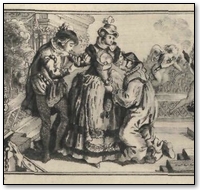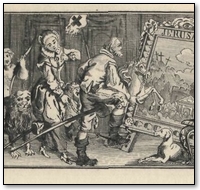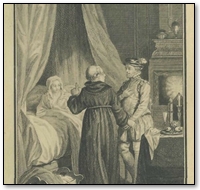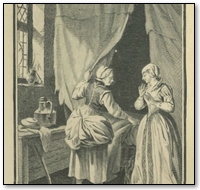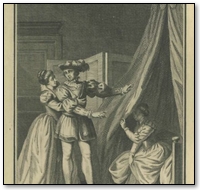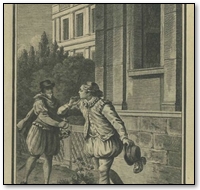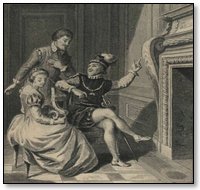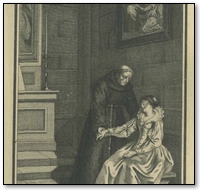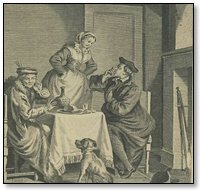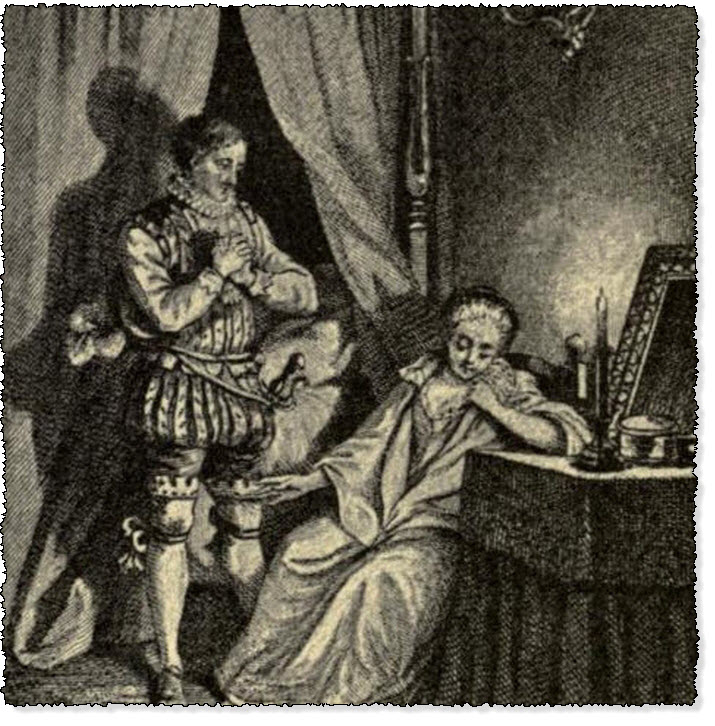
Bonnivet and the Lady of Milan
Day 2 of the Heptameron - Tale 14
Summary of the Fourth Tale Told on the Second Day of the Heptameron
Tale 14 of the Heptameron
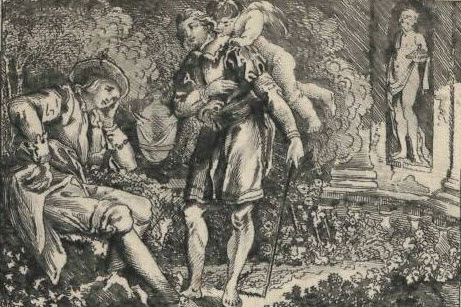
At the time when the Grand-Master of Chaumont was Governor of the Duchy of Milan, (1) there lived there a gentleman called the Lord of Bonnivet, who by reason of his merits was afterwards made Admiral of France. Being greatly liked by the Grand-Master and every one else on account of the qualities he possessed, he was a welcome guest at the banquets where the ladies of Milan assembled, and was regarded by them with more favour than ever fell to a Frenchman's lot, either before or since; and this as much on account of his handsome countenance, grace of manner, and pleasant converse, as by reason of the renown which he had gained among all as being one of the most skilful and valorous soldiers of his time. (2)
One day during the carnival, when he was among the maskers, he danced with one of the most beautiful and bravely attired ladies to be found in the whole city; and whenever a pause occurred in the music of the hautboys, he did not fail to address her with love speeches, in which he excelled all others. But she (3) having no favourable reply to give him, suddenly checked his discourse by assuring him that she neither loved nor ever would love any man but her husband, and that he must by no means expect that she would listen to him.
The gentleman, however, would not take this answer for a refusal, and continued to press his suit with great energy until mid-Lent. But he found her still firm in her declaration that she would love neither himself nor another, which he could not believe, however, seeing how ill-favoured was her husband, and how great her own beauty. Convinced that she was practising dissimulation, he resolved, on his own side, to have recourse to deception, and accordingly he ceased to urge his suit, and inquired so closely concerning her manner of life that he discovered she was in love with a most discreet and honourable Italian gentleman.
Little by little the Lord of Bonnivet insinuated himself into the friendship of this gentleman, and did so with so much discretion and skill, that the other remained ignorant of his motive, and became so much attached to him that, after the lady of his heart, there was no one in the world whom he loved more. In order that he might pluck his secret from his breast, the Lord of Bonnivet pretended to tell him his own, declaring that he loved a certain lady to whom he had in truth never given a thought, and begging that he would keep the matter secret, and that they might have but one heart and one mind together. Wishing to show in return a like affection, the poor Italian gentleman thereupon proceeded to disclose at length the love that he bore the lady on whom Bonnivet wished to be revenged; and after this they would meet somewhere once every day in order to recount the favours that had befallen them during the past four and twenty hours; with this difference, however, that one lied, and the other spoke the truth. And the Italian confessed that he had loved this lady for three years, but had never obtained anything of her save fair words and the assurance of her love.
Bonnivet then gave him all the advice that he could to enable him to attain his end, and to such good purpose that in a few days the lady consented to grant all that was sought of her. It only remained to devise a plan for their meeting, and through the counsels of Bonnivet this was soon accomplished. And so one day before supper the Italian said to him—
"I am more beholden to you, sir, than to any other man living, for, thanks to your good advice, I expect to obtain to-night that which I have coveted so many years."
"I pray you, my friend," thereupon said Bonnivet, "tell me the manner of your undertaking, so that if there be any risk in it, or craft required, I may serve you in all friendship."
The Italian gentleman then began to tell him that the lady had devised a means of having the principal door of the house left open that night, availing herself as a pretext of the illness of one of her brothers for whose requirements it was necessary to send into the town at all hours. He might enter the courtyard, but he was to be careful not to go up by the principal staircase. Instead of this he was to take a small flight on his right hand, and enter the first gallery he came to, into which the rooms of the lady's father-in-law and brothers-in-law opened; and he was to choose the third door from the head of the stairs, and if on trying it gently he found that it was locked, he was to go away again, for in that case he might be sure that her husband had returned, though not expected back for two days. If, however, he found that the door was open, he was to enter softly, and boldly bolt it behind him, for in that case there would be none but herself in the room. And above all, he was to get himself felt shoes, in order that he might make no noise, and he was to be careful not to come earlier than two hours after midnight, for her brothers-in-law, who were fond of play, never went to bed until after one of the clock.
"Go, my friend," replied Bonnivet, "and may God be with you and preserve you from mischief. If my company can be of any service to you, I am wholly at your disposal."
The Italian gentleman thanked him warmly, but said that in an affair of this nature he could not be too much alone; and thereupon he went away to set about his preparations.
Bonnivet, on his part, did not go to sleep, for he saw that the time had come for revenging himself upon his cruel love. Going home betimes, he had his beard trimmed to the same length and breadth as the Italian's, and also had his hair cut, so that, on touching him, no difference between himself and his rival might be perceived. Nor did he forget the felt shoes, nor garments such as the Italian was wont to wear. Being greatly liked by the lady's father-in-law, he was not afraid to go to the house at an early hour, for he made up his mind that if he were perceived, he would go straight to the chamber of the old gentleman, with whom he had some business on hand.
About midnight he entered the lady's house, and although there were a good many persons going to and fro, he passed them unnoticed and thus reached the gallery. Trying the first two doors, he found them shut; the third, however, was not, and he softly pushed it open. And having thus entered the lady's room, he immediately bolted the door behind him. He found that the whole chamber was hung with white linen, the floor and ceiling also being covered with the same; and there was a bed draped with cloth so fine and soft and so handsomely embroidered in white, that nothing better were possible. And in the bed lay the lady alone, wearing her cap and night-gown, and covered with pearls and gems. This, before he was himself perceived by her, he was able to see by peeping round the curtain; for there was a large wax candle burning, which made the room as bright as day. And fearful lest he should be recognised by her, he first of all put out the light. Then he undressed himself and got into bed beside her.
The lady, taking him to be the Italian who had so long loved her, gave him the best possible reception; but he, not forgetting that he was there in another's stead, was careful not to say a single word. His only thought was to execute his vengeance at the cost of her honour and chastity without being beholden to her for any boon. And although this was contrary to her intention, the lady was so well pleased with this vengeance that she deemed him rewarded for all she thought he had endured. At last it struck one of the clock, and it was time to say good-bye. Then, in the lowest tones he could employ, he asked her if she were as well pleased with him as he was with her. She, believing him to be her lover, said that she was not merely pleased but amazed at the greatness of his love, which had kept him an hour without answering her.
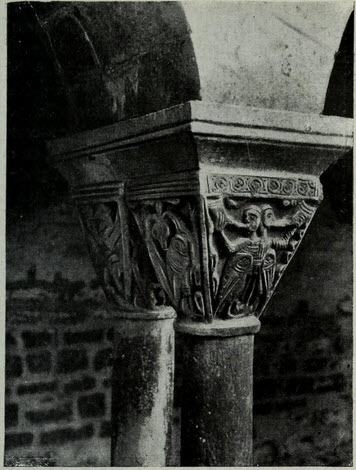
Heptameron Story 14
Then he began to laugh aloud, and said to her—
"Now, madam, will you refuse me another time, as you have hitherto been wont to do?"
The lady, recognising him by his speech and laughter, was in such despair with grief and shame, that she called him villain, traitor, and deceiver a thousand times over, and tried to throw herself out of bed to search for a knife in order to kill herself, since she was so unfortunate as to have lost her honour through a man whom she did not love, and who to be revenged on her might publish the matter to the whole world.
But he held her fast in his arms, and in fair soft words declared that he would love her more than her lover, and would so carefully conceal all that affected her honour that she should never be brought to reproach. This the poor foolish thing believed, and on hearing from him the plan that he had devised and the pains that he had taken to win her, she swore to him that she would love him better than the other, who had not been able to keep her secret. She now knew, said she, how false was the repute in which the French were held; they were more sensible, persevering, and discreet than the Italians; wherefore she would henceforward lay aside the erroneous opinions of her nation and hold fast to him. But she earnestly entreated him not to show himself for some time at any entertainment or in any place where she might be unless he were masked; for she was sure she should feel so much ashamed that her countenance would betray her to every one.
This he promised to do, and he then begged that she would give her lover a good welcome when he came at two o'clock, getting rid of him afterwards by degrees. This she was very loth to do, and but for the love she bore to Bonnivet would on no account have consented. However, when bidding her farewell, he gave her so much cause for satisfaction that she would fain have had him stay with her some time longer.
Having risen and donned his garments again, he departed, leaving the door of the room slightly open, as he had found it. And as it was now nearly two o'clock, and he was afraid of meeting the Italian gentleman, he withdrew to the top of the staircase, whence he not long afterwards saw the other pass by and enter the lady's room.
For his own part, he then betook himself home to rest, in such wise that at nine of the clock on the following morning he was still in bed. While he was rising, there arrived the Italian gentleman, who did not fail to recount his fortune, which had not been so great as he had hoped; for on entering the lady's chamber, said he, he had found her out of bed, wearing her dressing-gown, and in a high fever, with her pulse beating quick and her countenance aflame, and a perspiration beginning to break out upon her. She had therefore begged him to go away forthwith, for fearing a mishap, she had not ventured to summon her women, and was in consequence so ill that she had more need to think of death than of love, and to be told of God than of Cupid. She was distressed, she added, that he should have run such risk for her sake, since she was wholly unable to grant what he sought in a world she was so soon to leave. He had felt so astonished and unhappy on hearing this that all his fire and joy had been changed to ice and sadness, and he had immediately gone away. However, he had sent at daybreak to inquire about her, and had heard that she was indeed very ill. While recounting his griefs he wept so piteously that it seemed as though his soul must melt away in his tears.
Bonnivet, who was as much inclined to laugh as the other was to weep, comforted him as well as he could, telling him that affections of long duration always had a difficult beginning, and that Love was causing him this delay only that he might afterwards have the greater joy. And so the two gentlemen parted. The lady remained in bed for some days, and on regaining her health dismissed her first suitor, alleging as her reason the fear of death that had beset her and the prickings of her conscience. But she held fast to my lord Bonnivet, whose love, as is usual, lasted no longer than the field flowers bloom.
"I think, ladies, that the gentleman's craftiness was a match for the hypocrisy of the lady, who, after playing the prude so long, showed herself such a wanton in the end."
"You may say what you please about women," said Ennasuite, "but the gentleman played an evil trick. Is it allowable that if a lady loves one man, another may obtain her by craft?"
"You may be sure," said Geburon, "that when such mares are for sale they are of necessity carried off by the last and highest bidder. Do not imagine that wooers take such great pains for the ladies' sakes. It is for their own sakes and their own pleasure."
"By my word," said Longarine, "I believe you; for, truth to tell, all the lovers that I have ever had have always begun their speeches by talking about me, declaring that they cherished my life, welfare, and honour; but in the end they only thought of themselves, caring for nought but their own pleasure and vanity. The best plan, therefore, is to dismiss them as soon as the first portion of their discourse is ended; for when they come to the second, there is not so much credit in refusing them, seeing that vice when recognised must needs be rejected."
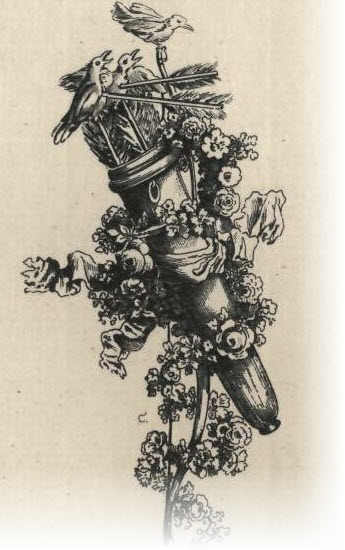
"So as soon as a man opens his mouth," said Ennasuite, "we ought to refuse him, without knowing what he is going to say?"
"Nay," replied Parlamente, "my friend does not mean that. We know that at first a woman should never appear to understand what the man desires, or even to believe him when he has declared what it is; but when he comes to strong protestations, I think it were better for ladies to leave him on the road rather than continue to the end of the journey with him."
"That may be," said Nomerfide; "but are we to believe that they love us for evil? Is it not a sin to judge our neighbours?"
"You may believe what you please," said Oisille; "but there is so much cause for fearing it to be true, that as soon as you perceive the faintest spark, you should flee from this fire, lest it should burn up your heart before you even know it."
"Truly," said Hircan, "the laws you lay down are over harsh. If women, whom gentleness beseems so well, were minded to prove as rigorous as you would have them be, we men, on our part, would exchange our gentle entreaties for craft and force."
"In my opinion," said Simontault, "the best advice is that each should follow his natural bent. Whether he love or not, let him do so without dissimulation."
"Would to God," said Saffredent, "that such a rule would bring as much honour as it would give pleasure."
Dagoucin, however, could not refrain from saying—
"Those who would rather die than make their desire known could not comply with your law."
"Die!" thereupon said Hircan; "the good knight has yet to be born that would die for the publishing of such a matter. But let us cease talking of what is impossible, and see to whom Simontault will give his vote."
"I give it," said Simontault, "to Longarine, for I observed her just now talking to herself. I imagine that she was recalling some excellent matter, and she is not wont to conceal the truth, whether it be against man or woman."
"Since you deem me so truthful," replied Longarine, "I will tell you a tale which, though it be not so much to the praise of women as I could wish it to be, will yet show you that there are some possessed of as much spirit, wit, and craft as men. If my tale be somewhat long, you will bear with it in patience."
Footnotes:
- M. de Lincy is of opinion that the incidents recorded in this story took place between 1501 and 1503; but according to M. Lacroix, the Grand-Master of Chaumont did not become Governor of the Milanese till 1506. This personage, to whom Queen Margaret frequently alludes in her tales, was Charles d'Amboise, nephew of the famous Cardinal d'Amboise, minister to Louis XII. In turn admiral and marshal, Governor of Paris, and Grand-Master, in France, of the Order of St. John of Jerusalem, he figured prominently in the Italian wars of the time, and notably at the battle of Aignadel. In 1510 he commanded the troops which fought on behalf of the Duke of Ferrara against the Emperor and Pope Julius II., and the latter having excommunicated him for bearing arms against the Holy See, his mind is said to have become unhinged. He died at Correggio in February 1511, when only thirty-eight years of age, some biographers asserting that he was poisoned, whilst others contend that he fell from a bridge during a military expedition. Whilst on his death-bed, he sent messengers to the Pope, begging that the decree of excommunication against him might be annulled, but before the Papal absolution arrived he had expired. The name of Chaumont, by which he is generally known, is that of an estate he possessed, between Blois and Amboise, on the Loire. The reputation he enjoyed of being one of the handsomest men of his time was well deserved, if one may judge by a painting at the Louvre which is said to be his portrait. This picture, long ascribed to Leonardo da Vinci, and supposed to represent Charles VIII. of France, has been identified as the work of Andreas Solario, who executed numerous paintings for Cardinal d'Amboise at the famous château of Gaillon.—L. M. and Eu.
- Some particulars concerning William Gouffier, Lord of Bonnivet, have been given in vol. i. (Tale IV. n. 3). It may here be mentioned that the domain whence he derived the name by which he is generally known was in the neighbourhood of Poitiers, around the village of Vendeuvre, where he built himself a vast château, destroyed at the close of the eighteenth century. Some fragments of the sculptured work adorning it, remarkable for their elegance of design and delicacy of workmanship, are in the Poitiers Museum. It is not unlikely that the incidents related in Tale IV. occurred at this château; or else at that of Oiron, another domain of the Gouffiers, between Loudun and Bressuire. In the chapel of Oiron were buried Bonnivet, his mother, his brother Artus, and his nephew Claud. Their tombs, large marble mausoleums of Italian workmanship, surmounted by recumbent statues, were opened and mutilated by the Huguenots in 1568, when the bones they contained were scattered to the winds. Bon-nivet's statue is probably the most damaged of the four. The château of Oiron, with its marble staircases, quaint frescoes, sculptured medallions, &c, testifies to the great wealth possessed by the Gouffier family, and justifies the cynical motto assumed by Bonnivet's nephew: "Others have beaten the bushes, but we have the birds."—Ed.
- This lady may perhaps be the "Sennora Clerice" (Clarissa) of whom Brantôme writes as follows in his Capitaines François:—"It was Bonnivet alone who advised King Francis to cross the mountains and follow M. de Bourbon, and in this he had less his master's advantage and service at heart than his desire to return and see a great and most beautiful lady of Milan, whom he had made his mistress some years previously.... It is said that this was the 'Sennora Clerice,' then accounted one of the most beautiful ladies of Italy.... A great lady of the time, from whom I heard this story, told me that he, Bonnivet, had commended this lady Clerice to the King so highly as to make him desirous of seeing and winning her; and this was the principal cause of this expedition of the King's."—Lalanne's OEuvres de Brantôme, vol. ii. p. 167-8.—L.
Online Edition of the Heptameron
This is the Heptameron of Marguerite de Navarre
Other Sites: CruikshankArt.com · Dante's Inferno · Book-Lover.com · Canterbury Tales ·
This site is created by the Heptameron Information Society.


